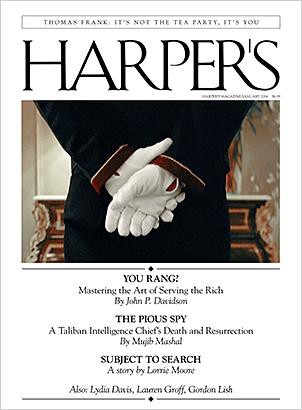Managing the Houses of the Super-rich

Ms. Bullock defined some of the basic terminology we would use. “Principals” are the owners of a property, the ultimate employers. An “estate manager” runs houses larger than 18,000 square feet or multiple properties; for small properties, the job description is “house manager” …
To maintain boundaries, we had to speak, dress, and carry ourselves with fastidious professionalism, and we had to be on guard when our employers tried to treat us like family. If they urged us to make use of their possessions — a spin in the Bentley, a weekend at the Malibu house, even a swim in the pool — we should under no circumstances consider doing so.
“How do you address your principal?” Ms. Bullock asked rhetorically, before telling us about a site visit she’d once made in Dallas. “The house manager was the only person on staff allowed to speak to the principal. He had recruited a housekeeper from another position, and on her first day, working in the hallway, she said good morning to the woman of the house as she passed by. At the end of the day, the housekeeper was gone.”
On my flight back to New York, I picked up the January issue of Harper’s at an airport newsstand and read the cover story by John P. Davidson about the time he made up a resume and got admitted to The Starkey Institute, a “butler boot camp” which certifies estate managers to work for the super-rich (cost of attending the institute: $16,795, including room and board). Davidson’s goal was to be hired by a rich person to manage their home and get paid six figures, which is typically what estate managers earn. The story is currently behind a paywall, but it was too good and fascinating to not excerpt here.
For example, it can be a huge chore to just manage the refrigerators of the super-rich:
Getting the details right was especially important when there were several houses, so that consistency could be maintained from property to property in the remotes for television sets, the controls for lighting and security systems, the organization of kitchen and bathroom cupboards. Principals did not want to fumble around, lost in their own houses. Ms. Fowler used Excel spreadsheets to stock refrigerators with soft drinks, then lined up and photographed the contents so that a glance would tell what needed replenishment. She religiously checked the expiration dates on cans of soda: if you own seven houses and each has as many as six refrigerators — two in the kitchen, one in the garage or storeroom, one in the pool house, one in the master suite, one in the screening room — for a total of forty-two refrigerators, it’s possible that years could pass before a can of soda is opened.
Incredible, right? Definitely pick up the issue if you’re interested in reading more — if only for all the Downton Abbey references Davidson makes.
Support The Billfold
The Billfold continues to exist thanks to support from our readers. Help us continue to do our work by making a monthly pledge on Patreon or a one-time-only contribution through PayPal.
Comments